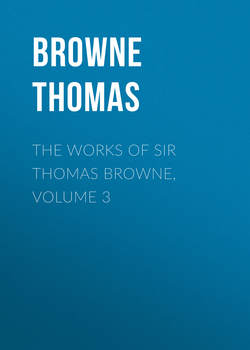Читать книгу The Works of Sir Thomas Browne, Volume 3 - Browne Thomas - Страница 13
THE SEVENTH BOOK
CHAPTER XI
More compendiously of some others
ОглавлениеMany others there are which we resign unto Divinity, and perhaps deserve not controversie. Whether David were punished only for pride of heart in numbring the people, as most do hold, or whether as Josephus and many maintain, he suffered also for not performing the Commandment of God concerning capitation; that when the people were numbred, for every head they should pay unto God a shekell, we shall not here contend. Surely, if it were not the occasion of this plague, we must acknowledge the omission thereof was threatned with that punishment, according to the words of the Law. Exod. 30. When thou takest the sum of the children of Israel, then shall they give every man a ransom for his soul unto the Lord, that there be no plague amongst them. Now how deeply hereby God was defrauded in the time of David, and opulent State of Israel, will easily appear by the sums of former lustrations. For in the first, Exod. 38. the silver of them that were numbred was an hundred Talents, and a thousand seven hundred three-score and fifteen shekels; a Bekah for every man, that is, half a shekel, after the shekel of the sanctuary; for every one from twenty years old and upwards, for six hundred thousand, and three thousand and five hundred and fifty men. Answerable whereto we read in Josephus, Vespasian ordered that every man of the Jews should bring into the Capital two dragms; which amounts unto fifteen pence, or a quarter of an ounce of silver with us: and is equivalent unto a Bekah, or half a shekel of the Sanctuary. What the Attick dragm is. What the didrachmum and the stater, Mat. 17. 27. For an Attick dragm is seven pence halfpeny or a quarter of a shekel, and a didrachmum or double dragm, is the word for Tribute money, or half a shekel; and a stater the money found in the fishes mouth was two Didrachmums, or an whole shekel, and tribute sufficient for our Saviour and for Peter.
We will not question the Metamorphosis of Lots wife, or whether she were transformed into a real statua of Salt: though some conceive that expression Metaphorical, and no more thereby then a lasting and durable column, according to the nature of Salt, which admitteth no corruption: in which sense the Covenant of God is termed a Covenant of Salt; and it is also said, God gave the Kingdom unto David for ever, or by a Covenant of Salt.
That Absalom was hanged by the hair of the head, and not caught up by the neck, as Josephus conceiveth, and the common argument against long hair affirmeth, we are not ready to deny. Although I confess a great and learned party there are of another opinion; although if he had his Morion or Helmet on, I could not well conceive it; although the translation of Jerom or Tremelius do not prove it, and our own seems rather to overthrow it.
How Judas might die.
That Judas hanged himself, much more, that he perished thereby, we shall not raise a doubt. Although Jansenius discoursing the point, produceth the testimony of Theophylact and Euthimius, that he died not by the Gallows, but under a cart wheel, and Baronius also delivereth, this was the opinion of the Greeks, and derived as high as Papias, one of the Disciples of John. Although also how hardly the expression of Matthew is reconcilable unto that of Peter, and that he plainly hanged himself, with that, that falling head-long he burst asunder in the midst, with many other, the learned Grotius plainly doth acknowledge. And lastly, Although as he also urgeth, the word ἀπήγξατο in Matthew, doth not only signifie suspension or pendulous illaqueation, as the common picture discribeth it, but also suffocation, strangulation or interception of breath, which may arise from grief, despair, and deep dejection of spirit,Strangulat inclusus dolor. in which sense it is used in the History of Tobit concerning Sara, ἐλυπήθη σφόδρα ὥστε ἀπάγξασθαι. Ita tristata est ut strangulatione premeretur, saith Junius; and so might it happen from the horrour of mind unto Judas. So do many of the Hebrews affirm, that Achitophel was also strangled, that is, not from the rope, but passion. For the Hebrew and Arabick word in the Text, not only signifies suspension, but indignation, as Grotius hath also observed.
Many more there are of indifferent truths, whose dubious expositions worthy Divines and Preachers do often draw into wholesome and sober uses whereof we shall not speak; with industry we decline such Paradoxes, and peaceably submit unto their received acceptions.
